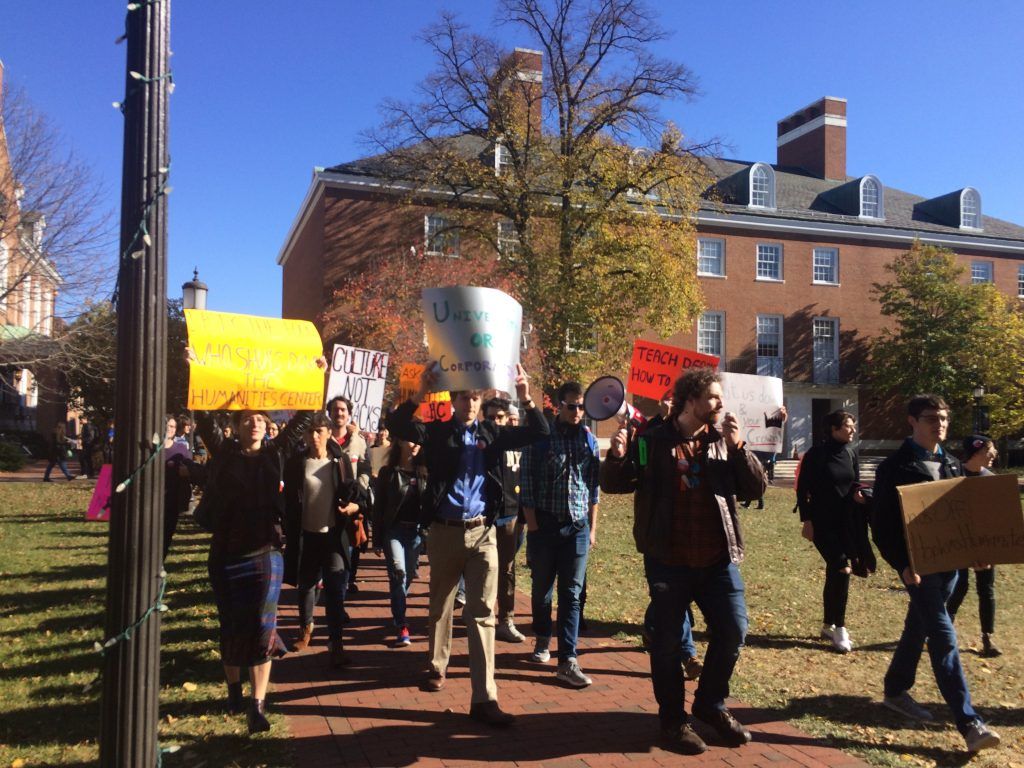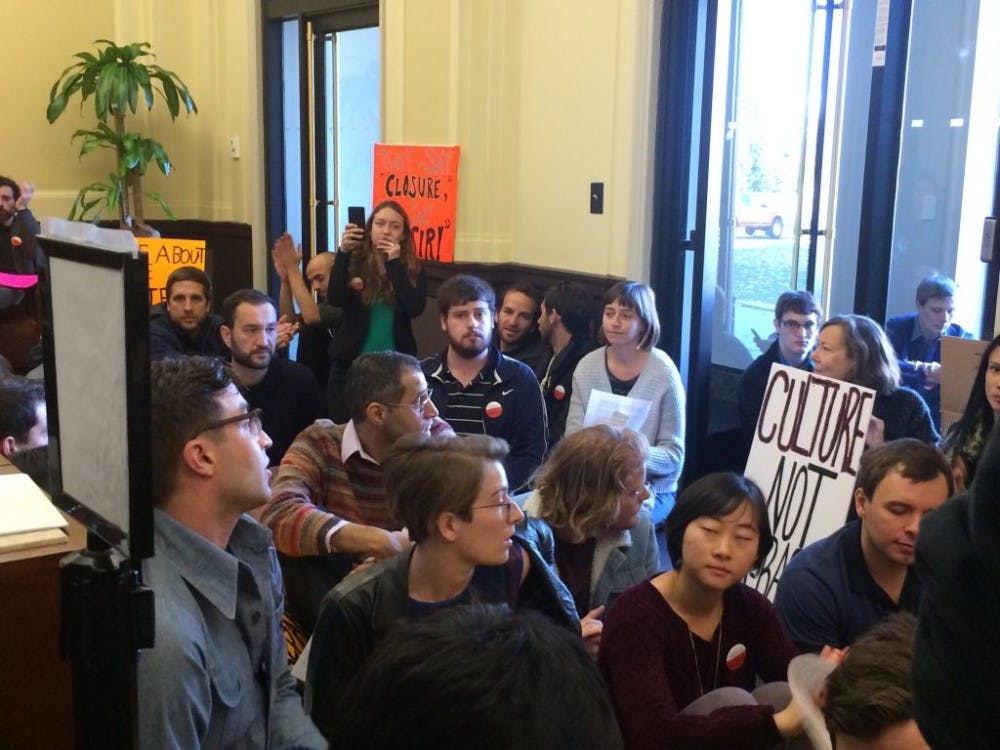Supporters of the Humanities Center (HC) marched last Thursday, Nov. 17, from Levering Courtyard to the Wyman Park Building to confront Dean of the Krieger School of Arts and Sciences (KSAS) Beverly Wendland about the Center’s possible closure.
Protesters held signs that read, “Cut Admin, Not Departments” and “Teach Deans how to read.” They also shouted chants like, “Beverly, Ronnie D., We will not go quietly,” “Cut back, Fight back” and “Don’t smoke Alexander’s Grass,” referencing the recently created Alexander Grass Humanities Institute (AGHI).
Once in the Wyman Park Building’s lobby, protesters discovered that Wendland was off campus. Instead, they met Matthew Roller, vice dean of graduate education, Betsy Bryan, vice dean for humanities and social sciences, and Lee James, executive director of Hopkins security.
Protesters insisted on delivering a collection of letters and petitions supporting the HC directly to Wendland. Given the Dean’s absence, the demonstrators held a sit-in where they read their out their demands and continued to chant. After about 45 minutes, the protesters disbanded, promising to return in two weeks.
Demonstrators presented arguments in favour of the Center. HC graduate student Jacob Levi urged the administration to recognize its importance.
“The founding moment [of the HC] said that intellectual activity was important in its own sake, for its own sake,” Levi said. “By looking back at our founding moment we can see that not only was it important then, not only was it important now, but never has it been more important for our future.”
Rishi Awatramani, a sociology graduate student and a member of Teachers and Researchers United (TRU), contextualized the fight for the HC as a fight for graduate students workers’ rights.
“Along with the Humanities Center being a place where first rate scholarship is produced, it’s also the place where faculty, students and administrative workers work and get their income to get their means to eat, to pay rent and to cover healthcare,” Awatramani said. “My fellow graduate workers, we got to understand this is a question of our work, of our livelihood.”
Cara Cummings, a philosophy graduate student, described the administration's tone as condescending.
“The most frustrating thing for me has been the rhetorical devices and the deflections that we’ve been met with when we try to discuss things with the administration,” she said. “We sent letters of support to the provost and the president and the neutral committee and the deans… the response was, ‘I love the humanities, Alexander Grass Humanities Institute, increase in several years of 20 faculty in the Krieger school.’ That’s not a response. That’s not meeting me as an intellectual peer.”
Casy McNeil, a graduate student of the political science department, views the HC’s potential closure as an extension of the University’s Strategic Plan, released in 2013. “Leaning Junior,” the hiring of junior faculty to replace retiring senior faculty was one part of that plan. She pointed out that this process raises revenue for the University because hiring junior faculty is cheaper than senior and they teach more undergraduate courses.
“Faculty and grad students said that in some of these smaller social sciences and humanities departments, that ‘Leaning Junior’ is not feasible,” McNeil said. “‘Leaning Junior’ means that graduate education will change as we know it, and that is exactly what is happening now with the Humanities Center. They are not saying this is part of the Strategic Plan, but this is an acknowledgment that ‘Leaning Junior’ for a department like the Humanities Center does not work. The department can’t stand like that.”

She explained how senior faculty in the political science department have yet to be replaced and how they were having trouble recruiting graduate students. She warned how no department was safe from “Leaning Junior.”
“They’re assuming that the Humanities Center is small. It’s students and faculty will feel that it is their fight alone, and that this is an isolated incident. We have to recognize that this is something that all of us will be affected by,” McNeil said. “The stakes are for all of us, and we have to treat this issue of the closure of the Humanities Center as what it is, which is a must win fight.”
Levi and other demonstrators do not believe that the administration has a legitimate reason to close the HC.
“We have been a fully functioning, effective department for all of this time, and there’s no reason that we have seen to indicate the contrary,” Levi said. “The administration on the other hand has shown absolutely no regard for what we actually do, they have shown no accountability for their decision, no transparency for the reasoning behind their decisions.”
Matthew Roller, vice dean of graduate education, disagreed with the protestors’ accusations that the administration was too opaque. He suggested that there were internal miscommunications within the HC.
“[The process] has been completely transparent. We have communicated this with the faculty in June which is when this issue came up and they are the people we communicate with. I mean, it’s up to them to then decide how they want to communicate things to their students,” he said. “Maybe it’s new to the students, but it’s up to the department chair to inform the students.”
Roller said that the demonstrators’ anger is based on a “misunderstanding.”
“I’ve heard a number of things here that are absolutely inaccurate which frustrates me,” he said. “If what the protesters are saying is true, you can see why they are angry. But we have clarified what the issues are and what the facts are, again, since we can’t seem to get through to them. I can sympathize with the anger if the anger was justified.”
Some undergraduates like Alicia Badea participated in the protest to voice their concerns over what this may mean for other departments within the humanities.
“I’m here to support [the protest] because I love the humanities and I love what the Humanities Center offers,” Badea said. “It sets a dangerous precedent if this department can just be closed down by one person. The other humanities may be on the same track.”
Katherine Logan contributed reporting.
Correction: This article originally named Katherine Goktepe as a graduate student of the political science department and attributed quotes to her. The graduate student's name is actually Casey McNeil. The name has been updated.





